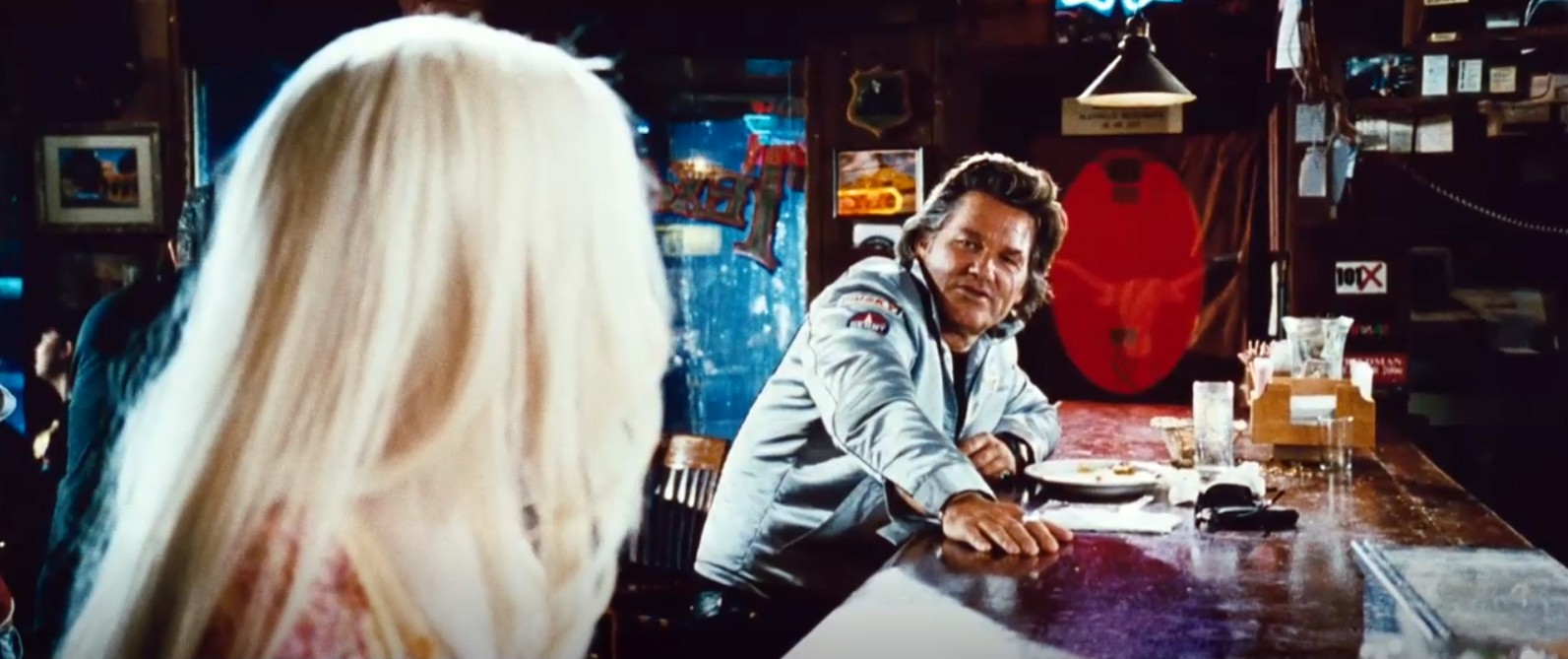How could a zombie-filled extravaganza mixed with the action of Kill Bill and the gritty detail of 28 Days Later flunk so badly in the box office? Aren’t the lot of you deranged halfwit homoerotic barbarians from 300 pleased with the inclusion of Rose McGowan in her titular role as a walking bazooka? I guess it’s because her character self-actualizes by literally penetrating to death her predatory male counterparts. Grindhouse is undoubtedly a “chick-flick,” some kind of bizarre tongue-in-cheek girl-power for the 21st century. Rodriguez has given us what Brokeback Mountain could not: a character whose (albeit absurd and fire-powered) idiosyncrasy neither predetermines her destiny nor invalidates it.
Granted, the subject matter and dialogue of Planet Terror is ridiculous. And that’s the point—this is exploitation cinema. You’re supposed to be able to predict every line that comes out of these characters’ mouths and relish in that power. Planet Terror invites this kind of interactivity in the film. When El Ray says, “I never miss,” it’s both the most trite, hypermasculine locution ever uttered and exactly true to form. At the same time, this is exploitation cinema that reinvents the genre: Rodriguez and Tarantino underwrite Planet Terror and Deathproof with themes that subvert the senseless sensationalism promoted by the original 1970’s genre films.
Now here’s the kicker. Tarantino follows up Planet Terror with two groups of women in Deathproof, whose narcissistic dialogue almost invariably causes (male) moviegoers to grunt uncomfortably with boredom. Why is that, do you think? Is it because men can’t handle women objectifying them as sex-objects? Or is it less sophisticated than that? Perhaps men want women on the big screen to remain silent or speechless as a subspecies prone to their influence—dead in one sense, and therefore easier to access. Is it still the case that “the death… of a beautiful woman is, unquestionably, the most poetical topic in the world,” as Edgar Allan Poe would have it?

When we first meet Stuntman Mike, he is undoubtedly the uber-male, whose demeanor suggests he is above the amateurish, booze-talking pranks of his college-age counterparts (these boys plot to essentially drug-rape the Act I protagonists, friends of a character conspiciously named Jungle Julia, by weaseling their way into a girls-only weekend out). The appeal of Stuntman Mike’s character upon his initial appearance isn’t his ability to seduce, deceive, and terrorize his female victims—Tarantino plays on the predatory underpinnings of masculinity itself, as a social construct, when he invites us to revel in Mike’s murderous rampage before the end of Act I. Catharsis destabilizes our moral centers, forcing us to raise (if only for a moment) the self-reflective glass of introspection, and confront ourselves. It is exactly the destructiveness of masculine desire that we see embodied in Jungle Julia’s perversely sexualized dismemberment. However, by introducing Zoe and her gear-head friends in Act II, Tarantino subverts the conventions of the genre (with the exception of the introduction of the “cheerleader,” who is disposed of by her friends perhaps because she represents that from which these women are trying to escape).
These women share a bond of friendship that is not circumscribed by masculine desire in the way their superficial, deceased predecessors are. I hear a lot of (male) moviegoers claiming they dislike Zoe because of her piercing, her accent, her “dykish” behavior and dress. But they really dislike her because she is superior to Stuntman Mike; her very name, which means “life” in Greek, opposes that paternal Logos of the Stuntman, whose immortality depends on his extraordinary ability to control life by defying death. It is inevitable, however, that Stuntman Mike must die. And so Tarantino unmasks the character’s rampant masculinity in the second Act, revealing it to be nothing more than a facade of homophobia and misogyny. As soon as Zoe and her gearheads use their sexuality as a weapon (they literally ram their vehicle “up his ass”), the Stuntman takes flight, the patrilineal order of the muscle-car disintegrates, and the girls reduce the Stuntman to a bloody pulp with their bare hands.
Despite fanboys’ flabbergasted attempts to rearrange the plot, “Deathproof” ends with Stuntman Mike’s death, which is legitimated by the women’s triumph over misogyny. Interesting, to say the least.



